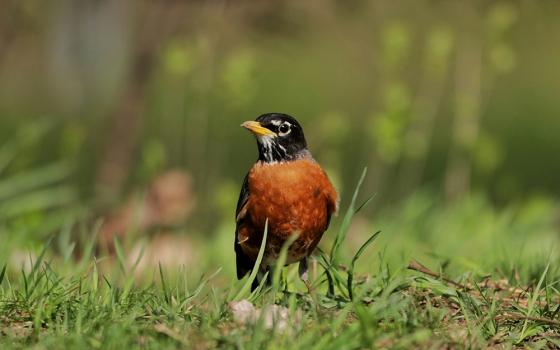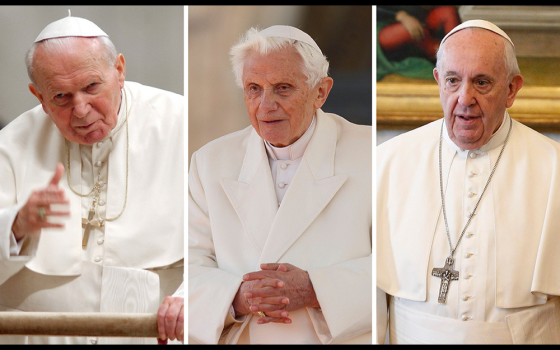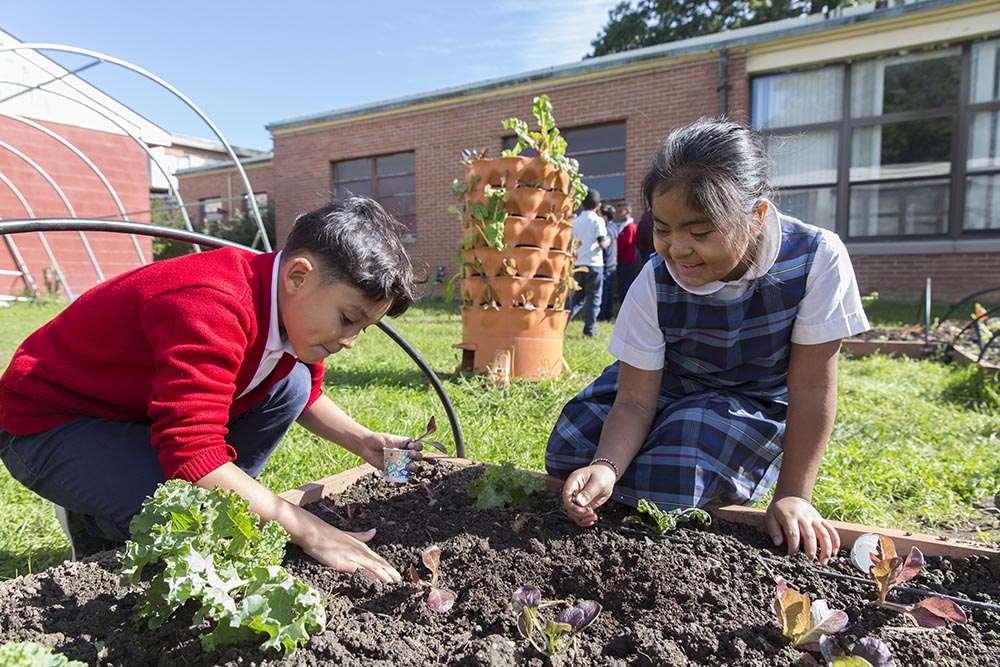
Students at St. Francis International School in Silver Spring, Maryland, tend lettuce and other greens in the school garden as a part of their environmental science curriculum in 2018. The Washington Archdiocese issued an action plan Aug. 16 based on Pope Francis' 2015 encyclical on caring for creation, "Laudato Si'." (CNS/Catholic Standard/Jaclyn Lippelmann)
In the face of social and environmental crises, the world would do well to follow the lead of its young people, Pope Francis said in a video message to mark the start of the Season of Creation.
"It makes me very happy to see that young people have the courage to undertake projects for environmental and social improvement, since the two go together. We adults can learn much from them, because in all matters related to care for the planet, they are at the forefront. Let us take advantage of their example and reflect on our lifestyle, especially during the moments of health, social and environmental crisis," Francis said in a video released Sept. 1 by the Pope's Worldwide Prayer Network.
Each month, the network prepares videos related to the pope's prayer intention. For September, it is praying for environmentally sustainable lifestyles.
"Let us choose to change! Let us advance with young people towards lifestyles that are simpler and more respectful of the environment," including in the ways people eat, travel and use water, energy and plastics, the pope said.
Francis urged people to make "courageous choices" toward more environmentally sustainable lives, and to draw inspiration from the example of young people "who are resolutely committed to this," Francis said, adding, "and they aren't foolish, because they are committed to their own future."
The video was released on the World Day of Prayer for the Care of Creation, which begins the annual ecumenical Season of Creation. Both celebrated for decades by Orthodox Christians, Francis has increasingly encouraged Catholics to mark the environmentally focused periods since the release of his 2015 encyclical "Laudato Si', on Care for Our Common Home."
Many parishes have used the season to hold Green Masses and environmentally themed prayer reflections, as well as tree plantings, local environmental cleanups and animal blessings on the season's final day, Oct. 4, the feast of St. Francis of Assisi.
This year, the Season of Creation carries the theme of "A home for all? Renewing the Oikos of God." Oikos is a Greek word meaning "home," and organizers have focused this year on how climate change and other environmental threats jeopardize the homes of millions of people as well as millions more species.
Season precedes critical climate summit
The Season of Creation arrives weeks ahead of a major United Nations climate summit, COP26. The gathering, set for Nov. 1-12 in Glasgow, Scotland, will be the first time in two years that governments will meet for negotiations to move forward in implementing the Paris Agreement.
In early August, the scientific working group of the U.N. Intergovernmental Panel on Climate Change (IPCC) issued a major report that found that all parts of the planet have experienced the effects of climate change, that it is "unequivocal" that human activities, including burning fossil fuels, have been the leading contributor to global warming, and that temperatures will continue to rise in the short term no matter how much greenhouse gas emissions are slashed.
Even under the most optimistic future scenarios, the planet is expected to eclipse 1.5 degrees Celsius of warming — the more ambitious goal in the Paris accord — during the 2030s.
Throughout the summer, signs of climate change have been on display.
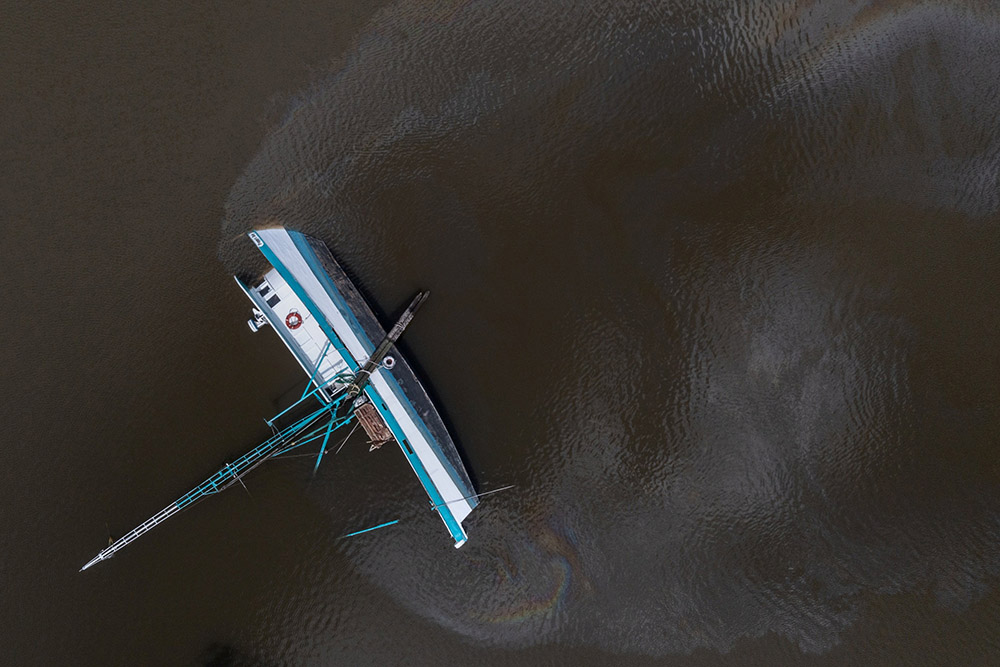
Fuel leaks from a capsized boat along Bayou Lafourche in Galliano, Louisiana, Aug. 31, in the aftermath of Hurricane Ida. (CNS/Reuters/Adrees Latif)
Just this week, Hurricane Ida slammed into Louisiana as one of the strongest in the Gulf Coast state's history. As ocean waters warm, the intensity of hurricanes and storms is expected to increase. And in California, national forests were closed Tuesday for two weeks in an effort to limit danger as extreme wildfires — exacerbated by historically dry conditions — continue to burn across the state and the Pacific Northwest.
"When it comes to the environment, climate change is one of the most serious moral challenges we face," Archbishop Paul Coakley of Oklahoma City and Bishop David Malloy of Rockford, Illinois, chairs of the U.S. bishops' conference domestic and international justice committees, wrote in a statement for the day of prayer for creation.
The two bishops encouraged Catholics to read and "seriously consider" the IPCC report's findings while also offering their own optimistic interpretation, saying "the news about the future is hopeful," in that the report "has now recognized that the most extreme and terrifying climate scenarios, the basis for many newsworthy apocalyptic predictions, are unlikely."
"Globally we have swiftly transitioned away from coal, and more likely climate scenarios point to a stable, albeit warmer, climate future. Climate change is serious and urgent, but it is not the end of the world," Coakley and Malloy wrote.
Scientists have said that climate-related risks become increasingly greater the more average global temperature increase surpasses 1.5 C, and some impacts are already becoming irreversible. The difference between 1.5 C and 2 C of warming, scientists said in a 2018 IPCC report, could mean exposing millions more people to severe heat waves, more intense storms, increased flooding, poverty and illnesses.
In only one of the 2021 report's five emissions-reduction scenarios is average temperature rise limited to 1.5 C, and even then it's projected to eclipse that mark temporarily. The IPCC report made clear that avoiding the direst scenarios depends on immediate and sharp reductions in emissions from key sources, including tropical deforestation and the use of fossil fuels.
Advertisement
And while the report's authors told the Associated Press the worst-case scenario — where the planet warms by 4.4 C from pre-industrial times by the end of the century — is increasingly unlikely, they said current trajectory points toward passing the Paris Agreement's less-stringent target of 2 C of warming by 2100.
Catholics urged to speak out
After the Angelus prayer in St. Peter's Square on Aug. 29, Francis said, "The cry of the Earth and the cry of the poor are becoming ever more serious and alarming, and they call for a decisive and urgent action to transform this crisis into an opportunity."
In an interview with COPE, a radio station owned by the Spanish bishops' conference, the pope said he plans to go to COP26 in person as long as his health permits. It is expected he would attend the summit of world leaders, scheduled for Nov. 1-2.
On the final day of the Season of Creation, Oct. 4, the pope will convene his own summit of scientists and leaders of the world's religions at the Vatican to draft a statement aimed at heads of state at COP26. That same day, the Dicastery for Promoting Integral Human Development is set to fully launch the Laudato Si' Action Platform, a global initiative to place Catholic institutions large and small on seven-year paths to sustainability.
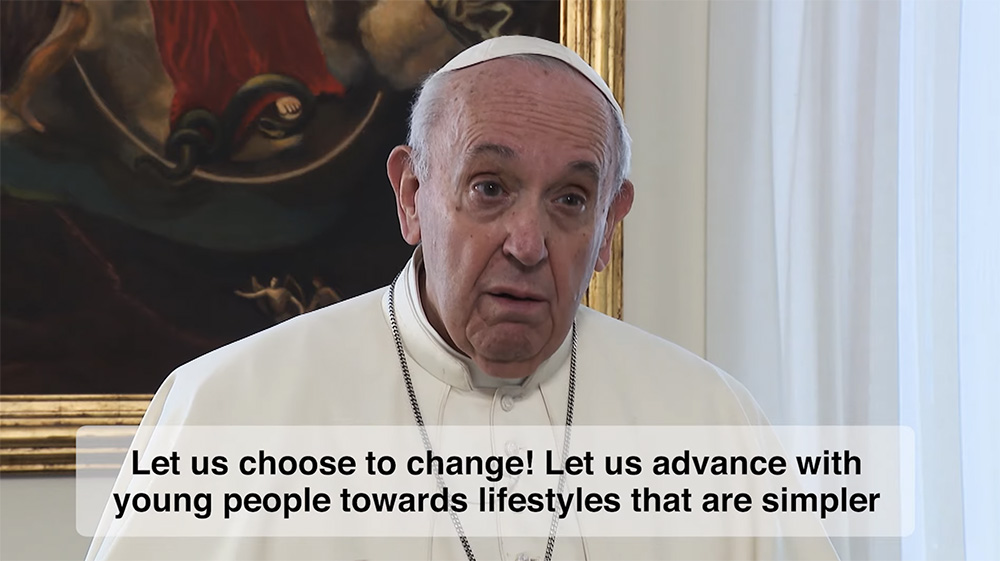
Pope Francis marks the beginning of the Season of Creation in a video released Sept. 1, on the World Day of Prayer for the Care of Creation, by the Pope's Worldwide Prayer Network. (NCR screenshot)
This Season of Creation will be "a critical moment for Catholics to lift up the voices of the most vulnerable and advocate on their behalf" ahead of both COP26 and the COP15 U.N. summit on biodiversity, Msgr. Bruno-Marie Duffé, secretary for the dicastery, said in a May letter.
Duffé also invited Catholics to sign onto the "Healthy Planet, Healthy People" petition that calls for robust global action at both of the U.N. summits. The petition, organized by the Laudato Si' Movement, has been collecting signatures since the spring and the conclusion of the Vatican's Laudato Si' anniversary year.
A similar petition led by the U.S.-based Catholic Climate Covenant seeks to press President Joe Biden and Congress to pass legislation to dramatically cut emissions from the country that historically has been the world's leading source.
The Catholic Bishops' Conference of the Philippines, one of the countries most vulnerable to climate change, has called on Catholics there to sign onto the Healthy Planet, Healthy People petition and promote it online. Six years ago, ahead of COP21 in Paris, Filipino Catholics contributed scores of signatures to a similar petition advocating for the adoption of the Paris climate accord.
In a pastoral statement Aug. 23, Archbishop Romulo Valles, president of the Philippines bishops' conference, repeated U.N. Secretary General Antonio Guterres' "code red for humanity" reaction to the IPCC report. He added that the Season of Creation this year comes with the planet "on the verge of the abyss."
"Our common home is on the brink of catastrophe. Urgent actions are needed," the archbishop said. "We hope that this Season of Creation would lead us to renew our commitment to action to ensure that all creation will have a safe and healthy home to flourish and participate in renewing the Oikos of God."
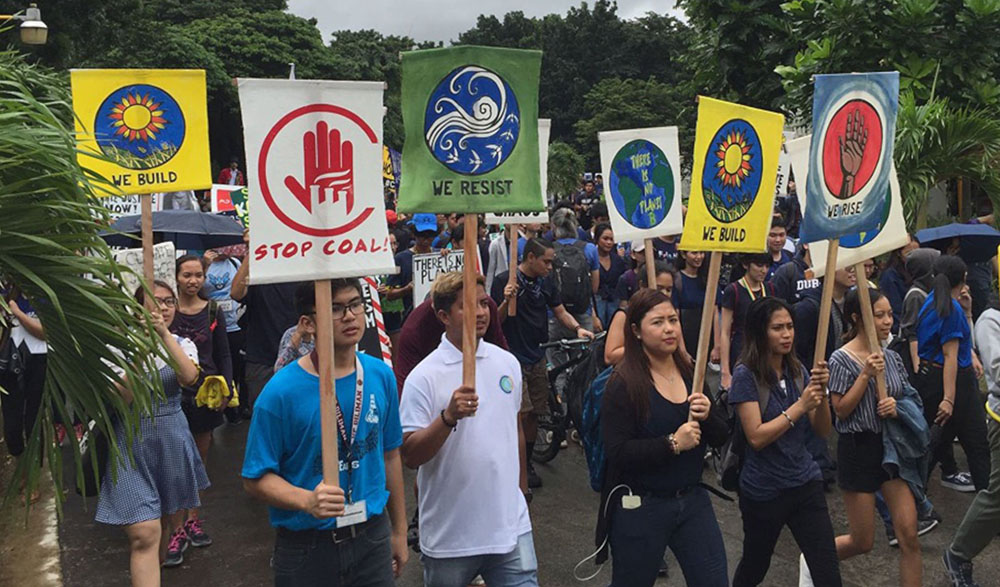
Youth climate activists in Manila, Philippines, were among 4 million people worldwide who participated in the Global Climate Strike in September 2019. (CNS/Courtesy of Global Catholic Climate Movement)
Dublin Archbishop Dermot Farrell, who issued his own 64-page pastoral letter Aug. 30 on "the climate catastrophe," said that "the havoc of the [coronavirus] pandemic will pale compared to that of climate change."
But among the greatest dangers it poses, he wrote in the letter, "are the loss of hope and the inaction that follows in its wake."
"Human beings have always been confronted by their insignificance before the vastness of the universe, and their powerlessness in the face of nature's power. This has often been the context in which God has revealed to mortals our true role in the universe and in God's design," Farrell wrote. "At this time, our God asks us to respond decisively and with urgency to the cry of the earth. That means, as parishes, groups, individuals, we have to figure out what will make a real difference and act to implement it."




